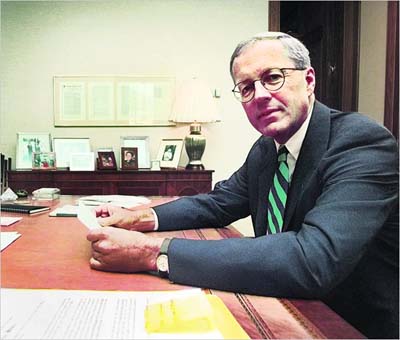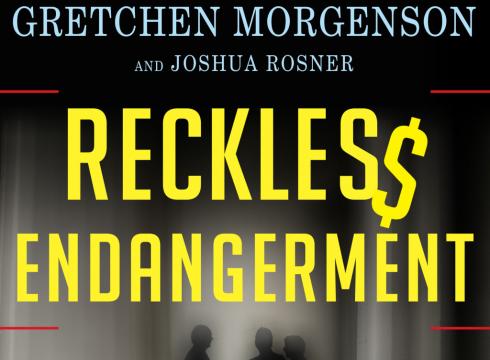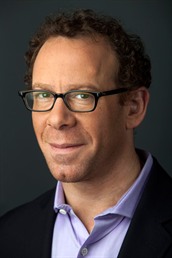
Venture capitalist and thief James Johnson at his desk. He might be the most connected bastard in America.
“Josh and I felt compelled to write this book because we are angry that the American economy was almost wrecked by a crowd of self-interested, politically influential, and arrogant people who have not been held accountable for their actions. We also believe that it is important to credit the courageous and civically minded people who tried to warn of the impending crisis but who were run over or ignored by their celebrated adversaries.”
– Gretchen Morgenson
The Brooklyn Bridge is not for sale, at least not legally, but it was shut down last night as the NYPD arrested around seven hundred protestors. People have been demonstrating for a couple weeks now. They appear to be the same people who protest the World Bank and the other manifestations of the global financial power.
This is the flower-power end of the spectrum of protest. We hear a lot about the Tea Party and the rhetoric of the infuriated right. The folks in New York are more about social justice, corporate greed and global warming than opposition to wild stimulus plans.
Those are generalized goals, I know, and there doesn’t appear to be anything specific that can be done to ameliorate their concerns. They are just pissed, and march down to Wall Street from their campgrounds each day shouting “This is what democracy looks like!”
I suppose that is true, in a way, but if we got to vote about government bailout money being spent on corporate bonuses, or lending practices loosened to the point that borrowers were not required to put up a dime on houses they could not afford.
Anyway, having been savaged fairly well by the collapse of the housing bubble, I take more than a passing interest in how the whole thing came to pass. I read the early accounts of the collapse with interest, as people attempted to explain the complex financial instruments that did us in.
“The Big Short” by Michael Lewis and Too Big To Fail by Andew Ross Sorkin were good primers on the massive institutional fraud, which involved everyone of consequence in all the investment banks.
The documentary “Inside Job” was a memorable adventure into how Wall Street ticked in those years, and I particularly enjoyed the Hooker who explained some of the more exotic forms of Executive compensation common on The Street, and still is, I suppose.
At the end of the day, while we all know what happened, it was strange that no one could pin the rose on anyone in particular as being responsible.
I was at the DMV the other day- one of those eternal visits in which a mysterious woman at the central desk assigns chits with letters and numbers on them- “Now Serving A28,” was the first thing I heard on the loudspeaker. I looked at my chit, and it read “F134.”
I sighed and flipped open the leather cover on my iPad and fingered the Kindle app and began to read Gretchen Morgenson and Joshua Rosen’s book “Reckless Endangerment.”
All titles these days have a long sentence explaining what they are about, presumably because our attention spans are so limited and our choices so many. The tag line for Gretchen and Josh’s outing in financial hell is: “How Outsized Ambition, Greed, and Corruption Led to Economic Armageddon.”
I was fascinated that Gretchen tagged the guy who arguably created the climate, set the rules, and drove the train towards the abyss.
He is not on Wall Street at the moment, so the protestors are unlikely to actually confront the bastard who is responsible. I will get to him in a minute.
Gretchen is well qualified to write the book. She does a financial column for the New York Times, has won a Pulitzer for the quality of her analysis. She joined The Times as assistant business and financial editor in May 1998, after stints at Forbes and Worth Magazines. While at Forbes, she uncovered anti-investor practices on the Nasdaq that actually sparked action by the DoJ and the SEC.
Joshua Rosner did the heavy lifting on the analytic side. He is managing director at the independent research consultancy Graham Fisher and Co. and was among the first analysts to identify accounting problems at Fannie Mae and Freddie Mac.
This has been going on a long time, twenty years, anyway, and if you want to point to the beginning of it all, you might as well start with de-regulation in the Reagan Administration, though sad to say, most of the more spectacular frauds are Democrats.
Of them, James A. Johnson is The Man. He is connected to everyone who had anything to do with the disaster. The list is right out of the headlines. He was into Barney Frank, dispensing a key job at Fannie to the Congressman’s lover; he took cozy loans from Angelo Mozila, just like Senator Chris Dodd, he ran a taxpayer-funded lobbying machine to brace every member of Congress he could shower money on.
There are walk-on parts for Larry Summers, Tim Geithner and Ben Bernanke, of course, and AlanGreenspan and Hank Paulson and all the others who engineered disaster.
I have to say, though, it is Johnson who is the most memorable and thorough-going son of a bitch. He ran Fannie Mae like it was a mob outfit, and he may be out of government but he is still at it.
Gretchen points out that he took $100 million out of Fannie Mae in executive compensation in the years he headed the institution, 1990-98, and then documents exactly how he did it in collusion with crooked lenders.
His successor at Fannie Mae, Franklin Raines, continued to pay himself handsomely. Gretchen quotes an Office of Federal Housing Enterprise Oversight (OFHEO) report from around the time of the last feeble attempt to rein in the mortgage giant that found Johnson had improperly deferred $200 million in expenses.
A subsequent report OFHEO report found that Fannie Mae had substantially under-reported Johnson’s compensation in 1998. Originally reported as $6–7 million, Johnson actually received approximately $21 million to parachute back into the private sector.
Gretchen described Johnson as “corporate America’s founding father of regulation manipulation.” Since his departure from quasi-government at Fannie Mae, he has been a board member of Goldman-Sachs, Gannet, KB Home, Target, Temple-Inland and is a former Director of UnitedHealth Group.
With his millions, Johnson currently hangs his hat at the merchant bank and private equity fund management company Perseus LLC. It should come as no surprise that it is headquartered in Washington, D.C., with an office in New York and an associated advisory firm in Munich.
Oh, the prospectus for Perseus LLC says they are heavily invested in Green Energy and the Health Sector, so Johnson is not done meddling with the regulators and has vested interests in all the new frauds being perpetrated by the unholy alliance of Government and Wall Street.
Johnson was the prime architect of the crisis. He may no longer command center stage, but he remains a respected member of the business or regulatory community. As Gretchen says: “The failure to hold central figures accountable for their actions sets a dangerous precedent. A system where perpetrators of such a crime are allowed to slip quietly from the scene is just plain wrong.”
Not to mention criminal. I could go on, but why not just get the book. It is a great read. The thing about the crisis is that it isn’t over yet. Bank of America, the giant institution, bought Angelo Mozila’s crappy mortgages and that disastrous decision may yet kill the institution.
If it does not make you want to march over to Perseus LLC with a torch.
James A. Johnson works at 2099 Pennsylvania Avenue, NW, on the 9th floor, by the way, if you know any protestors who actually want to confront the bastard that did this to us.
Copyright 2011 Vic Socotra
www.vicsocotra.com



